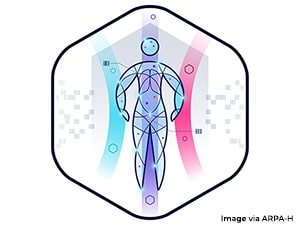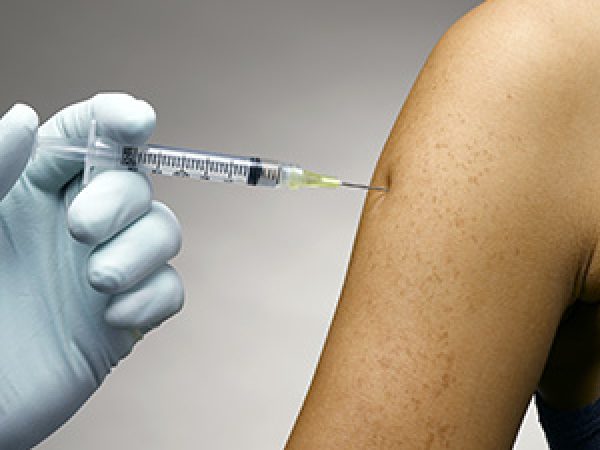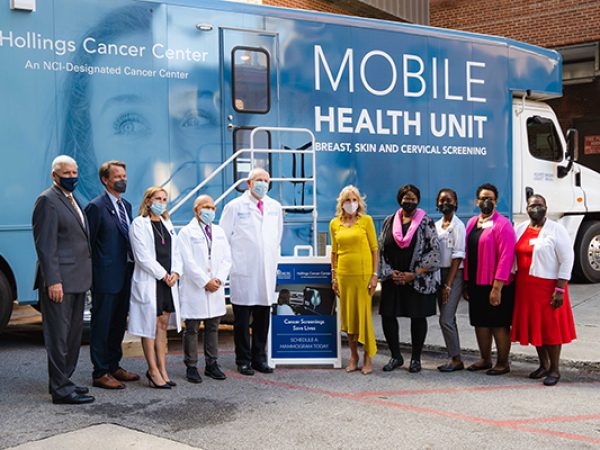Cancer Screening for All: A Revolutionary Approach to Accessible, Best-in-Class, Multi-Cancer Early Detection
By Ross Uhrich, DMD, MBA, ARPA-H Program Manager for POSEIDON and NITRO programs, Health Science Futures Mission Office
What if a simple test could save millions of lives by catching cancer early?
This question is at the heart of a new Advanced Research Projects Agency for Health (ARPA-H) funding opportunity announced in August 2024. It’s called the Platform Optimizing SynBio for Early Intervention and Detection in Oncology Program, or POSEIDON. POSEIDON envisions a future in which all cancers are detected early—while they are still localized, and curative treatment is most likely. To make this bold vision a reality, POSEIDON will support the development of first-in-class, at-home, over-the-counter, synthetic-reporter-based Multi-Cancer Early Detection (MCED) tests capable of detecting 30+ different types of stage 1 cancers using only breath or urine samples.
The field of cancer screening needs a revolution. Currently, recommended cancer screenings only include four types: breast, cervical, colon, and lung. While these four cancers make up 35% of all incidences, due to suboptimal screening uptake and barriers to access, their recommended screenings often don’t reach underserved and vulnerable communities, resulting in increased mortality due to later diagnoses. Notably, cancer incidence is rapidly rising in younger adults, most of whom do not meet the recommended age for routine screenings. These changing demographics have created an urgent health care need that is not addressed by recommended screening options.
Current Multi-Cancer Detection (MCD) tests, which rely on cancer-specific molecular signatures passively shed by tumors into the bloodstream to detect multiple cancer types, offered a promising approach to cancer screening when they first became available. However, their reliance on native tumor-shed biomarkers, which are rarely, if at all, present in sufficient quantities for early solid tumors, has resulted in sub-optimal stage 1 detection as demonstrated in published clinical studies.

POSEIDON is grounded in synthetic biology (synbio) to generate tunable, credible, cancer-specific signals using engineered sensors and reporters. These sensors and reporters, which will be designed in accordance with rigorous programmatic performance metrics, could mean that we will never need to rely on endogenous signals to detect cancer early.
If successful, POSEIDON will not only change the way we think about cancer screening, but also accelerate progress toward the Cancer Moonshot’s goal of ending cancer as we know it. By accurately detecting stage 1 cancer, when the tumors are still small and the chances of survival are high, POSEIDON aims to drastically improve the probability of successful curative treatment and recovery. With a two to three times increase in treatment costs for late-stage cancer and a projected rise in late-stage diagnoses, POSEIDON has the potential to make a significant, lasting contribution to the future of cancer care for all Americans. POSEIDON is currently accepting solution summaries via the Program’s Innovative Solutions Opening.
Accelerating the Future of Cancer Screening
POSEIDON’s MCED tests will use sensors engineered to identify cancer-specific molecular signatures in the tumor microenvironment and respond by releasing synthetic reporters designed for detection in urine or breath. With sensors constructed to find tumors wherever they are in the body and synthetic reporters engineered for optimal stability, sensitivity, and half-life, POSEIDON is positioned to overcome key limitations of endogenous biomarkers in current MCD tests.
Targeting Cancers Based on Unmet Need
Rather than relying on the passive release of endogenous, cancer-specific signals, POSEIDON’s bioengineered sensors will create unique signals for a preselected list of cancers with the highest unmet need using tunable, synthetic reporters for each cancer. POSEIDON’s evidence-based selection process prioritizes cancers hardest to detect at stage 1 and with highest survival benefit from stage 1 detection (Source: five-year relative survival by stage at diagnosis and stage distribution of incidence; NCI’s SEER database).
Human-Centered Design
POSEIDON’s design and objectives are informed by input from leaders across industry, academia, government, regulatory affairs, and cancer health disparities research and advocacy. Additionally, a large, Institutional Review Board-approved, anonymous survey was conducted among respondents from all sociodemographic backgrounds, including underserved and vulnerable populations and communities with documented cancer health disparities. The POSEIDON team plans to continue these surveys throughout the Program to ensure input from patients, caregivers, advocacy groups, and providers is integrated into all aspects of the potential technologies.
POSEIDON awardees are also expected to prioritize equitable and accessible innovations, routinely collect and incorporate user input into their designs, and engineer their tests with patients, providers, and payers in mind. Each team will be required to have a dedicated Engagement Officer and an Outreach Coordinator, who will interface with community leaders and health care providers and will establish a companion cancer outreach program to promote screening uptake.
The Path to Creating a Cancer Moonshot
Making revolutionary progress within the field of cancer screening means taking big swings. This is where ARPA-H comes in. We seek to accelerate better health outcomes for everyone by funding the development of high-impact solutions to some of society’s most challenging health problems and supporting research programs that would otherwise be deemed too risky by traditional grantmaking agencies or the private sector.
However, moonshots do not occur in a vacuum. Cooperation between government, academia, nonprofits, and private industry is crucial to achieving transformative change. To that end, POSEIDON executed a memorandum of understanding (MOU) with the NCI’s Cancer Screening Research Network (CSRN) to ensure that tests that successfully exit POSEIDON will have the opportunity to enter the CSRN’s diverse, multi-center cancer screening trial ecosystem. This novel, cross-governmental collaboration creates a seamless path for successful POSEIDON teams to go from ideation through translation, allowing POSEIDON’s next-generation, first-in-class MCED tests to reach all Americans.
A Call to Action for the Cancer Research Community
POSEIDON welcomes solution summaries from technical leaders with the skills and expertise to develop MCED tests capable of screening for 30+ different types of cancers using only breath and/or urine samples. POSEIDON will require teaming between experts in synthetic biology, cancer research, hardware and software engineering, medical device development, big cancer data, experimental models of cancer, high-throughput in vitro and large-scale in vivo validation, cancer health disparities research, community outreach, clinical trial design, regulatory strategies, and translation.
With your engagement and expertise, we aim to produce a self-administered kit that will allow any American adult to screen for cancer even before symptoms arise. By putting accessible, affordable screening tools in the hands of people across the country, we seek to increase survival rates and decrease cancer-related costs for all Americans.
It’s time to join us in taking this bold leap towards a better future for everyone.

Ross Uhrich, DMD, MBA, is an ARPA-H Program Manager, board-certified surgeon, and assistant professor of surgery. Since joining ARPA-H in February 2023, Uhrich has proposed, developed, and launched two programs (NITRO and POSEIDON), both to address key health care challenges for all Americans. Prior to ARPA-H, he worked as a board-certified oral & maxillofacial surgeon and assistant professor of surgery at Walter Reed National Military Medical Center (WRNMMC) and the Uniformed Services University of the Health Sciences, respectively. In addition to these roles, Uhrich spent 12 years with the U.S. Navy, finishing his tenure as a Lieutenant Commander. Uhrich holds a bachelor of science in biomedical engineering from Yale University, a doctorate in dental medicine with honors from the University of Pennsylvania, and an MBA with a focus in entrepreneurship, strategy and leadership from the University of Virginia Darden School of Business. He completed his Oral & Maxillofacial Surgery residency at WRNMMC and is a Diplomate of the American Board of Oral & Maxillofacial Surgery.
ARPA-H is a federal R&D funding agency with the mission of accelerating better outcomes for everyone by advancing innovative research that addresses society’s most challenging health problems.



